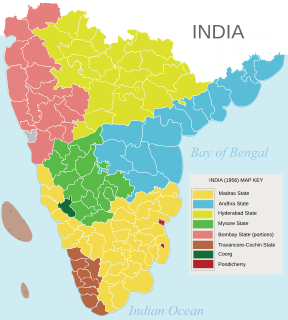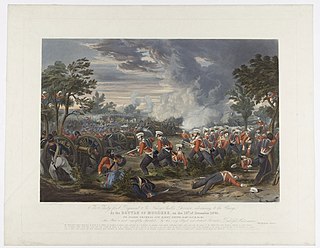
The Kodava is an endangered Dravidian language and it is spoken in Kodagu district in Southern Karnataka, India. The term Kodava has two related usages. Firstly, it is the name of the Kodava language and culture followed by a number of communities from Kodagu. Secondly, within the Kodava-speaking communities and region (Kodagu), it is a demonym for the dominant Kodava people. Hence, the Kodava language is not only the primary language of the Kodavas but also of many other castes and tribes in Kodagu. The language has two dialects: Mendele and Kiggat.

Guru Tegh Bahadur was the ninth of ten Gurus who founded the Sikh religion and the leader of Sikhs from 1665 until his beheading in 1675. He was born in Amritsar, Punjab, India in 1621 and was the youngest son of Guru Hargobind, the sixth Sikh guru. Considered a principled and fearless warrior, he was a learned spiritual scholar and a poet whose 115 hymns are included in Sri Guru Granth Sahib, the main text of Sikhism.

The India Gate is a war memorial located astride the Rajpath, on the eastern edge of the "ceremonial axis" of New Delhi, formerly called Kingsway. It stands as a memorial to 84,000 soldiers of the British Indian Army who died in between 1914 and 1921 in the First World War, in France, Flanders, Mesopotamia, Persia, East Africa, Gallipoli and elsewhere in the Near and the Far East, and the Third Anglo-Afghan War. 13,300 servicemen's names, including some soldiers and officers from the United Kingdom, are inscribed on the gate. Designed by Sir Edwin Lutyens, the gate evokes the architectural style of the memorial arch such as the Arch of Constantine, in Rome, and is often compared to the Arc de Triomphe in Paris, and the Gateway of India in Mumbai.

Codava National Council, is a social organisation in the Indian state of Karnataka. Formerly CNC was known as KRMM. The KRMM demanded a separate statehood status for Kodagu until the 1990s. Later they scaled down their demand. Ever since they have been demanding a Kodava hill council in Kodagu. The CNC Organisation's President is Nandineravanda U. Nachappa Kodava.

The Kodava people or Kodavas are an ethno-linguistic group from the region of Kodagu in the southern Indian state of Karnataka, who natively speak the Kodava language. They are traditionally land-owning agriculturists and patrilineal, with martial customs. Kodavas worship ancestors and weapons. They used to worship swords, bows, arrows and later guns. Hence, Kodavas are the only ones in India permitted to carry firearms without a license.

The Battle of Sobraon was fought on 10 February 1846, between the forces of the East India Company and the Sikh Khalsa Army, the army of the Sikh Empire of the Punjab. The Sikhs were completely defeated, making this the decisive battle of the First Anglo-Sikh War.

The Battle of Mudki was fought on 18 December 1845, between the forces of the East India Company and part of the Sikh Khalsa Army, the army of the Sikh Empire of the Punjab. The British army won an untidy encounter battle, suffering heavy casualties.
The 3rd (Lahore) Division was an infantry division of the British Indian Army, first organised in 1852. It saw service during World War I as part of the Indian Corps in France before being moved to the Middle East where it fought against troops of the Ottoman Empire.
The permanent arrival of Sikhism in England is dated to 1850 A.D. with the arrival of Maharajah Duleep Singh. The first Sikh place of worship, called a Gurdwara, was opened in 1911 in London and this was partly funded by the Maharaja of Patiala. Prior to this the first Sikh Society called Khalsa Jatha was formed in 1908.
Rao Bahadur Pemmanda K. Monnappa was a police officer of South India. He served in three Southern states, Madras, Hyderabad and Mysore (Karnataka), at different times. However he is to be best remembered for his contributions towards the integration of Hyderabad into the Union. Monnappa had a career in the Public Service reflected by his titles and medals.
Nadikerianda Chinnappa (1875–1931) was an Indian compiler, poet, translator, army man, police officer, cricket player, singer and philanthropist from Kodagu.
Boverianda Nanjamma and Chinnappa are translators and scholars of Kodava studies. Their Pattole Palame was written using the Kannada script originally. It has been translated into English by Boverianda Nanjamma and Chinnappa and has been published by Rupa & Co., New Delhi.

Palanganda T. Bopanna is an author and journalist from Kodagu (Coorg) in Karnataka, India. Bopanna has worked for some of the leading Indian English dailies, including The Times of India, Bangalore, for 12 years, and The Pioneer, as their Special Correspondent (Bangalore) for 13 years. He has written five books.
Pandyanda I. Belliappa was a Gandhian, a freedom fighter and politician from the erstwhile state of Coorg.

The Yarmouk Martyrs Brigade was a rebel group in southern Syria during the Syrian Civil War. For part of its existence it was connected to the Islamic State. It fought against several Syrian Opposition groups for dominance in the Yarmouk Basin. On 21 May 2016, it merged with other Islamist groups into the Khalid ibn al-Walid Army.

The Islamic Muthanna Movement is a Syrian Salafist rebel group based in Daraa that had been active during Syrian Civil War. After its formation in 2012 as the "Muthanna bin Haritha Vanquisher of the Persians Battalion", it expanded to a sizable group. The group has been described by the As-Safir newspaper as "one of the most powerful armed factions in Daraa".
The Daraa offensive was a military operation of two groups allegedly affiliated with the Islamic State of Iraq and the Levant, the Yarmouk Martyrs Brigade and the Islamic Muthanna Movement, against Syrian opposition forces in the Daraa Governorate.
Kalyatanda Ponnappa was a 17th-century hero of Kodagu (Coorg). The people of Kodagu have great faith in him. He is also known as Kaliat-Achchappa or Kaliat Ajjappa.










